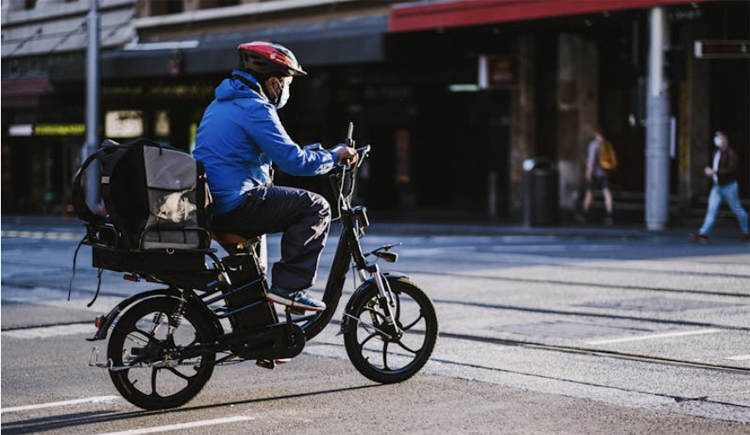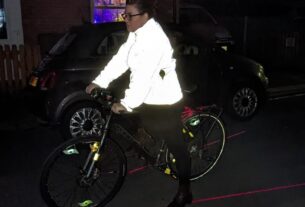This article explains the current state of the law regarding electric bikes (also known as e-bikes) in the UK. Note that this represents the personal view of the author, not the stated position of the Reading Cycle Campaign, and none of this should be taken or construed as legal advice.
While I have made every effort to be accurate regarding the relevant laws, I am not a legal professional and I recommend that you take legal advice if in any doubt. I have included links to UK government and other websites for reference.
What is an e-bike?
Contrary to much popular opinion, e-bikes are, subject to certain regulations described below, perfectly legal in the UK.
There is no single definition of an e-bike in the UK, So what are the types of e-bikes, according to UK law?
- Electrically assisted pedal cycle (EAPC)
- Speed pedelec
- Electric motorcycle
- E-scooter (not strictly bicycles, of course)
Different laws apply to these types, these will be described below.
Summary of the regulations
As we said above, different regulations apply to each type. So, let’s look at them in turn. Note that these regulations have changed over time, so we only discuss the current state.
Electrically assisted pedal cycle
Electrically assisted pedal cycles are the most common type in the UK. As the name implies, the intent of these bikes is that the motor assists and is not the primary motive power. Such bikes are classed as pedal cycles under the law and are subject to (mostly) the same regulations. The most important legal requirements are:
- The maximum power output should not exceed 250 watts.
- The motor should not provide power at higher speeds than 15.5mph (25km/h)
- The motor should assist and not be the sole power source. In other words, the rider should be pedalling for the motor to assist.
- Riders must be 14 years or older.
- The bike must carry some indication of its maximum speed and power output.
So, when someone on an e-bike overtakes you going uphill at 30mph without pedalling, the bike is certainly illegal.
Notes:
- There is ongoing discussion about whether the maximum power should be increased to 500W. This seems unnecessary to me, as this is roughly a fit club cyclist’s maximum continuous power output.
- There is no law against such a bike travelling at more than 15.5mph (if you are wondering why this odd-seeming speed was chosen, it equates to 25kph), providing the rider is the sole source of power.
- As these are legally pedal cycles, there is no requirement for tax, insurance, registration, protective gear, or type approval for the e-bike.
- Some e-bikes have a switch to allow for higher power and/or speed than would be allowed on the road, for example, for off-road use. It is unclear whether these are legal in the UK.
Speed pedelecs
A speed pedelec is like a legal e-bike, except it can go faster than 15.5mph under motor power, but not more than 28mph.
Under UK law, these are regarded as mopeds and are subject to the same laws as mopeds for tax, insurance, registration, type approval, and protective clothing.
Electric motorcycle
An electrically powered cycle that does not conform to the above regulations is regarded as a motorcycle and is subject to the same laws as a motorcycle for tax, insurance, registration, type approval, and protective clothing.
Electric scooters
Ah, the e-scooter. If you see one of these being ridden in Reading on public land, including highways and pedestrian paths, it is illegal. So when can they be used?
- On private land, subject to the owner’s consent and providing the rider is at least 14 years old.
- In certain pilot scheme areas, rental e-scooters, but not privately owned ones, can be used on public roads and cycle lanes, but not pavements.
- Riders must be at least 16 years old
- Riders must hold a driving licence with a Category Q (a moped, and included in full and provisional licences for cars and motorcycles)
- You must be insured (this is generally arranged by the rental company)
- Only one person at a time is allowed
- You cannot tow
- You must not use a mobile phone while riding – although you can use a screen for navigation and it is not clear if using a phone for this is allowed.
The trial areas for e-scooters are:
- Bournemouth and Poole
- Buckinghamshire (Aylesbury, High Wycombe, and Princes Risborough)
- Cambridge
- Essex (Basildon, Braintree, Chelmsford, and Colchester)
- Gloucestershire (Cheltenham and Gloucester)
- Liverpool
- London (participating boroughs)
- Milton Keynes
- Newcastle
- North and West Northamptonshire (Northampton, Kettering, Corby, Wellingborough, Rushden, and Higham Ferrers)
- North Devon
- Norwich
- Oxfordshire (Oxford)
- Salford
- Slough
- Solent (Isle of Wight, Portsmouth, and Southampton)
- Somerset (Taunton, Minehead and Yeovil)
- West Midlands (Birmingham)
- West of England Combined Authority (Bristol and Bath)
So definitely not Reading nor most of the surrounding areas.
What are the penalties?
One of our committee members is aware of a rider who had their illegal machine confiscated and (I believe) destroyed. In addition, there are fines, and you can get penalty points on your driving licence (even if you do not have one, they can be recorded).
Who is responsible?
The rider is responsible. There is an argument that companies who use riders for deliveries or as couriers have a duty to make their riders aware of the laws around e-bikes, but that is my opinion.
Links
Government sites
- Electrically assisted pedal cycles (EAPCs) in Great Britain: information sheet
- Electric bikes: licensing, tax and insurance
- Guidance on European type approval for certain electrically assisted pedal cycles (EAPC)
- Smarter regulation: proposed changes to legislation for electrically assisted pedal cycles
- New guidance to enhance e-bike and e-scooter safety
- E-scooter trials: guidance for users
Other useful sites
- Complete Guide to UK Law For Electric Bikes, Scooters, Mopeds & Motorbikes
- Are Electric Bikes Legal in the UK? 2024 E-Bike Law
- Electric Bike Laws UK: 13 Rules You Can’t Afford to Ignore
- Electric Motorcycles: UK Law, Licences and Regulations
Keith Collyer
Membership Secretary



